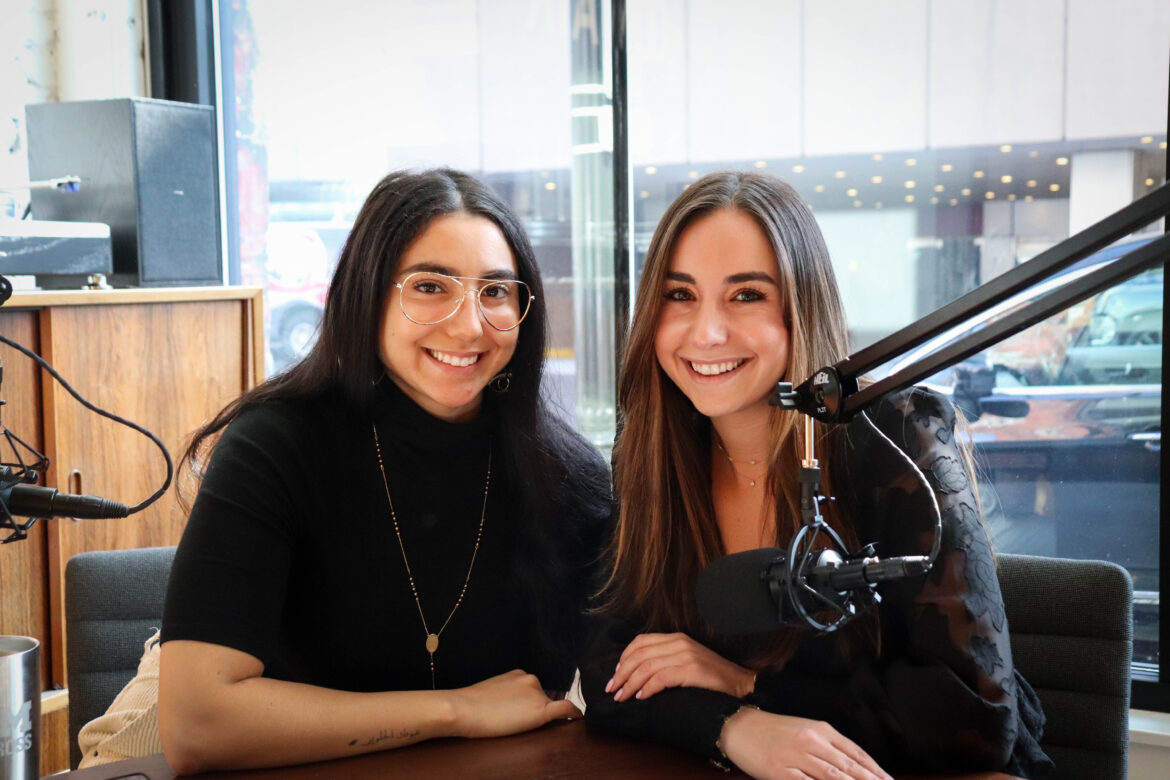
Photo courtesy of Yasmeen Kadouh
Rima Imad Fadlallah, left, and Yasmeen Kadouh sit in the studio where they record the “Dearborn Girl” podcast. The women launched the podcast in 2019 to create a space for and share the stories of Arab and Muslim American women.In high school, Rima Imad Fadlallah was nominated “most likely to succeed” and “most likely to stay in Dearborn.” At the time, she couldn’t fathom how those two things could coexist.
But now, at 28, Fadlallah has built her success around her hometown.
Tired of seeing their community misrepresented within mainstream media, in 2019 Kadouh and best friend Yasmeen Kadouh created “Dearborn Girl,” a podcast that creates a space for women like them: Arab and/or Muslim Americans.
Fadlallah says stories about the city typically focus on life post 9/11 and rarely highlight the unique experiences of the people living within its borders. Kadouh says news coverage of Dearborn has historically been problematic. She recalls reading headlines dubbing the city “Dearbornistan” or calling the local high school “Hezbollah High.”
Dearborn, Michigan, is the heart of Arab America. The city is home to the nation’s highest concentrations of Arab and Muslim Americans, creating one of the largest Arab communities outside the Middle East.
At the top of every “Dearborn Girl” episode, Kadouh introduces herself as “your Dearborn Girl poster child, lifelong learner and lover of all things social justice.”
“I love the idea that you can see yourself in another person,” Kadouh said.
Fadlallah calls herself “a proud daughter of Dearborn, avid vibe capitalist and professional love letter.” She said these descriptions represent the things she cares most about: her community, making the most of every situation and vocalizing her feelings. When she isn’t hosting “Dearborn Girl”, Fadlallah works as a brand and digital marketing consultant.
Kadouh said that growing up, no one wanted to be a Dearborn girl. She said that it “was always taking the parts of our Arab, Muslim identities that we wanted to hide and associating it with the term Dearborn Girl.”
The term, Fadlallah said, has come to represent a girl who is sheltered, uneducated and trashy.
But the women are trying to reclaim the phrase. “Dearborn Girl” began as a space where Arab/Muslim women within the community could feel empowered to share their stories, but the platform has grown beyond that. Kadouh and Fadlallah say they are tackling community needs by holding discussions on taboo topics like sexual harassment, racism and colorism.
Creative Director Malak Wazne, who is an award-winning documentary filmmaker and photographer, does all of the film and photo work for “Dearborn Girl.” She met Kadouh and Fadlallah when they interviewed her for the podcast. Wazne’s episode never aired, but she became a member of the team – and eventually Fadlallah’s sister-in-law.
Wazne said Kadouh and Fadlallah are the best people to be telling these stories because they don’t shy away from difficult conversations.
“They’re really genuine people, like whatever you see on social media or on the screen is how they are like in real life,” Wazne said.
After George Floyd’s murder and the resurgence of the Black Lives Matter movement, they created an IGTV series called “Know Better, Do Better.” The pair invited Black people from Dearborn to share their experiences and expose racist and colorist behavior within the community.
“If we don’t use this platform to uplift the most marginalized in our community or to talk about things that people are afraid to talk about and make the community better, it’s like, well, what do we have this space for?” Kadouh said.
Kadouh and Fadlallah said that “Dearborn Girl” was never created to captivate a non-Arab/Muslim audience.
“I think sometimes people hear our mission and they’re like, ‘So you’re trying to bridge the gap,’ and it’s like, no, we’re absolutely not,” Kadouh said. “We’re not apologizing for our identity, we’re not apologizing for who we are.”
But the podcast does provide outsiders with a window into their community and an opportunity to learn more about Arab and Muslim identity. The women said they hope outsiders can listen to their stories with empathy and an open heart.
“We’re not here to apologize for our identities,” Kadouh said. “But if you do want to learn and grow, absolutely, we’re more than happy to have you.”
“Dearborn Girl” is currently on hiatus due to the COVID-19 pandemic, but past episodes are on Apple Podcasts, Spotify and Stitcher.
The duo closes each episode of “Dearborn Girl” by asking their guests why they are proud to be one.
“It kind of instilled in me the sense of grit and resilience,” Fadlallah answered when asked the same question. “I don’t think I would be this grateful of a person if I didn’t have this perspective that only a place like Dearborn could give me.”
Kadouh said, “I like fitting in, in a place where nobody fits in.”